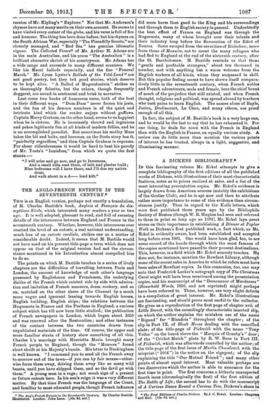THE ANGLO-FRENCH ENTENTE IN THE SEVENTEENTH CENTURY.*
Tuts is an English version, perhaps not exactly a translation, of M. Charles Bastide's book,• Anglais et Francais du dice- septieme Siècle, which interested many readers a year or two ago. It is well adapted, pleasant to read, and full of amusing details of the intercourse between England and France in the seventeenth century. Whether, however, this intercourse ever reached the level of an entente, a real national understanding, much less of an entente cordiale, strikes one as a matter of considerable doubt. Indeed, it seems that M. Bastide would not have used on his present title-page a term which does not appear on that of the original version had not the circum- stance mentioned in his Introduction almost compelled him to do so.
The points on which M. Bastide touches in a series of lively chapters are the difficulties of travelling between Paris and London, the amount of knowledge of each other's language possessed by Englishmen and Frenchmen, the underlying dislike of the French which existed side by side with admira- tion and imitation of French manners, dress, cookery, and so on, matched on the other shore of the Channel by a, much more vague and ignorant leaning towards English horses, English building, English ships ; the relations between the Huguenots in France and the Puritans in England, a curious subject which has till now been little studied ; the publication of French newspapers in London, which began about 1650 and was renewed after the Restoration ; and other instances of the contact between the two countries drawn from unpublished materials of the time. Of course, the upper and more familiar strata of history show something of all this. Charles L's marriage with Henrietta Maria brought many French people to England, though the "Mousers" found short shrift at his Majesty's hands. His letter to Buckingham is well known. "I command you to send all the French away to-morrow out of the town—if you can by fair means—other- wise force them away, driving them away like so many wild beasts, until you have shipped them, and so the devil go with them." A young man in a rage ; not much sign of a present or future entente here. In his son's reign it was a very different matter. By that time French was the language of the Court, and familiar to most educated people, though French influence The Anglo-French Entente in the Seventeenth Cent cry. By Charles Bastide. Illustrated. London: Jelin Lane. 1109. 64. set.]'
did more harm than good to the King and his surroundings and through them to English society in general. Undoubtedly the best effect of France on England was through the Huguenots, many of whom brought over their talents and their industry long before the Revocation of the Edict of Nantes. Some escaped from the severities of Richelieu ; more from those of Mazarin, not to count the many refugees who. had fled to England at the end of the sixteenth century, after the St. Bartholomew. M. Bastide reminds us that these "gentle and profitable strangers," about ten thousand is number, met with anything but a warm welcome from the English workers of all kinds, whom they surpassed in skill. But this popular feeling seems to have shown itself compara- tively little in the seventeenth century, when French ribblea and French adventurers, male and female, bore the chief brunt of much of the prejudice that still existed, and when French thought, religious and political, was spread abroad by teachers who took pains to learn English. The names alone of Bayle, Jurien, Drelincourt, Le Clem, and many others, are proof enough of all this.
In fact, the subject of M. Bastide's book is a very large one,. and he would be the last to say that he has exhausted it. for one thing, be deals far more with the French in England than with the English in France, an equally curious study. review can do little more than mention the various points of interest he has treated, always in a light, suggestive, and illuminating manner.










































 Previous page
Previous page